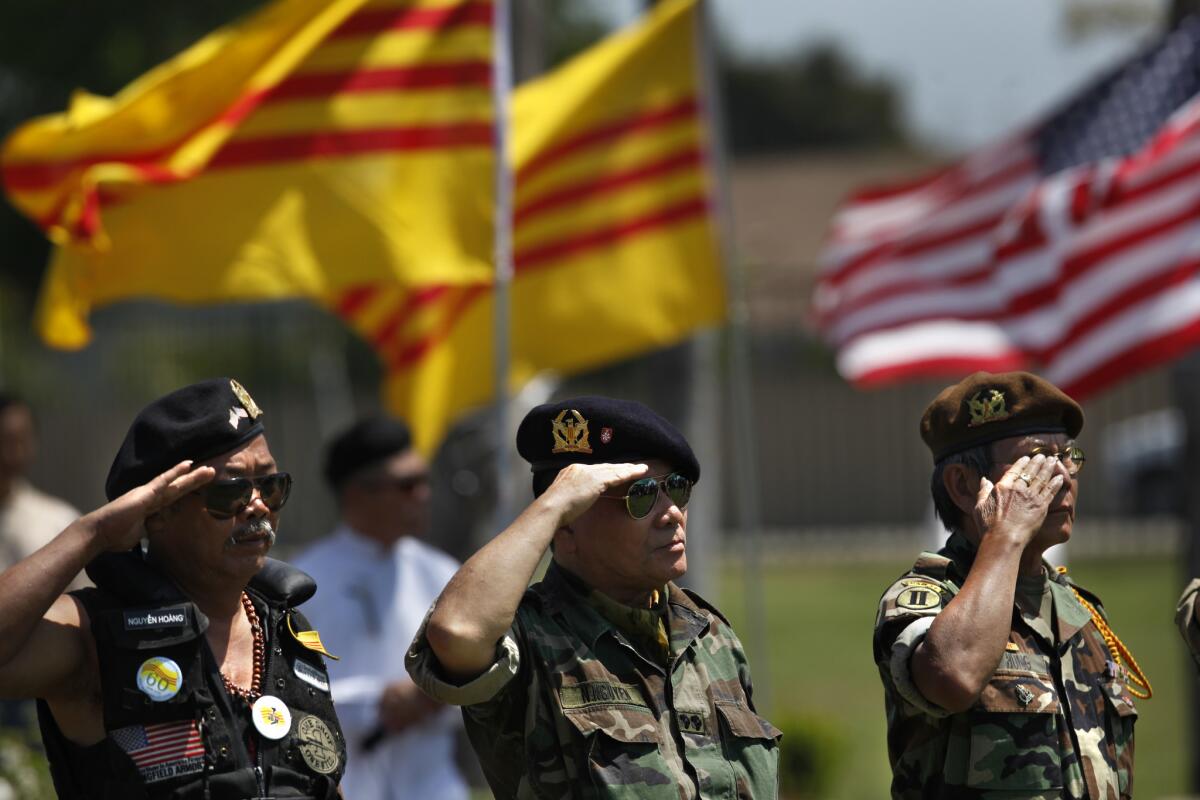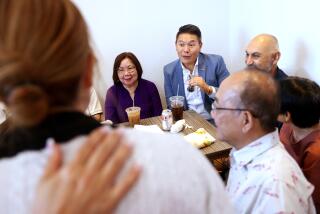Vietnamese immigrants mark Black April anniversary

- Share via
Under a soft rain, a balladeer stepped on the flag-decked stage, singing of lost lives, lost loves.
“Forty years later, we will never forget, ladies and gentlemen,” an emcee intoned as the crowd at a high school football stadium clapped. The commemoration of four decades since Black April, the fall of Saigon that ended the Vietnam War, drew more than 1,000 to Garden Grove.
At first, organizers planned a reunion at Camp Pendleton, a refugee haven that welcomed the first arrivals fleeing Vietnam in late April 1975. But military officials would not allow the flying of South Vietnam’s flag, a banner from an “unrecognized country,” on federal land. They acted on orders from the Pentagon and the U.S. State Department because the U.S. has diplomatic ties with Vietnam’s Communist regime.
So the event moved to Orange County’s Little Saigon, attracting a smaller audience but one infused with patriotic fervor.
“How can we leave the past behind? April 30 is always unforgettable. We think about it in the present,” said Loan Huynh of El Monte, a former Vietnamese Army captain.
Those around him at Bolsa Grande High School had come from the San Gabriel Valley, Fresno, Sacramento and Palo Alto -- their hearts heavy, separated from friends and family who could not escape, or died for their country.
“They can lose whatever they lost, but they still have their identity. That identity is symbolized by our flag -- and we protect the flag at all costs,” said John Thai Dinh, program director at Little Saigon TV and the event’s co-chair. “We could have brought 1,000 flags” into Camp Pendleton, “but if we could not salute it, then it means nothing.”
The yellow flag with three red stripes flew side by side with the American flag during a presentation of memorial wreaths and at a candlelight vigil. A women’s choir also draped flag scarves around their necks, while vendors sold $10 shirts with the emblem. Parents led their youngsters to a display of archived photos, tracing the refugees’ early months in their adopted country.
“Every year in this season, we feel pain but we also feel hope. The pain comes from those we leave behind -- our beloved children, a wife, a husband -- separated by war or not having the chance to flee Vietnam to experience peace and safety,” said Duc Thien Ngo, who led the organizing committee. “The hope comes from a community that cares about our history and pays tribute to it.”
The value of that history convinced the Library of Congress to recruit Vietnamese oral histories. Participants were invited to stop by a bus set up outside the event to share their stories.
“Finally, I am able to tell my child a bit more about what happened to us in the early days,” said Mai Doan, a mother from Santa Ana. “The 40 years is good timing for us to focus on lessons we have learned.”
Twitter: @newsterrier
More to Read
Sign up for Essential California
The most important California stories and recommendations in your inbox every morning.
You may occasionally receive promotional content from the Los Angeles Times.











